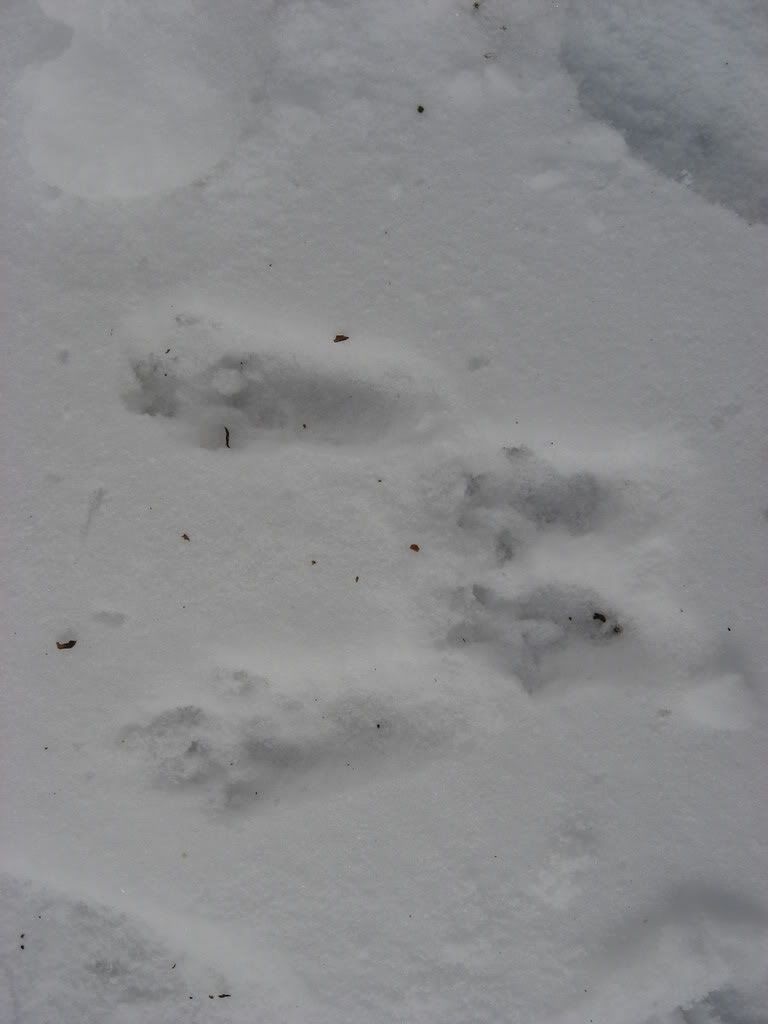
Above: Animal Tracks Jump Out After A Good Snow Fall
A couple of snow days are always nice when I don’t have to travel. I tend to hibernate and write during the winter months precisely because of the issues surrounding mountain road travel during snow conditions.
Yesterday I had to reschedule my day but caught up with some reading and training I needed to do online.
My participation in the Great American Backyard Bird Count was only hampered a little bit by the weather conditions because I could not see the lake or Grout Bay species clearly.
But my feeders were busy…except for yesterday when every species was hunkered down for the brunt of the storm.
Now because I don’t agree with habituating wild animals to humans, I don’t normally feed the birds EXCEPT when there is a snow storm.
The wildlife tends to hang out around my place anyway and it is amazing when the raccoons come to party on my deck (they like the rocker) or a coyote uses the shoveled staircase to travel down the hill instead of tromping through deep snow drifts.
Anyway, the reason I feed the birds during snow storms is because when snow conditions exist it is hard for the birds to access food from the ground or from their other sources.
This storm was intense with high winds and heavy snowfall. We had more than 13″ fall in less than 24 hours and it just started up again.
One of the tube feeders was clogged because of the snow and ice that blew into the delivery holes and a thick layer of snow covered the other gravity feeder that has been on the property since the 1980s.
So, I cleared the holes and then sprinkled seed on top of the deck railings. At the moment there is a bird party outside.
My neighbors like to feed the birds all year long. What they don’t realize is that is also attracts the rodents…and then, in my area, the rattlesnakes show up.
By rodents I mean rats and mice–but also grey squirrels, ground squirrels, and chipmunks that are dubbed “cute” by the locals.
The squirrels keep trying to get me to feed them and I keep telling them “no” but they are persistent.
Until I got the ultrasound rodent repellent device I always had to endure the chewing and romping of rodents who, attracted by my neighbor’s bird feeding habits, inevitably landed up living in the crawl space between my office area and the upstairs.
If you missed my squirrel negotiations story take a minute to read it now.
Rodents carry all kinds of diseases but it is hard to find statistics on squirrel bites. The CDC (Center for Disease Control) maintains a page with diseases spread by wildlife and a comprehensive CDC collection on rabies but it is hard to find data even if searching by the state department of health.
Wild birds also carry some nifty diseases which you can find outlined at the USGS National Wildlife Health Center…plus they poop everywhere–which is a good way to spread disease.
Even Cornell has posted a guide to Diseased Birds at Your Feeder.
I did find this nifty article on squirrel bites from Edinburgh which states:
The experience of animal bites in the six years
1987-92 in two accident and emergency departments in
Edinburgh was reviewed. Patients who had presented
with squirrel bites were followed up.
A total of 2591 patients presented with animal bites
during the six years, of whom 25 (age 3-77 years) had
been bitten by squirrels. No patient presented with a
squirrel bite during 1987. All had been bitten on the
hand.
Twenty one patients were successfully contacted for
further details. Of these, 16 (76%) were bitten while
feeding a grey squirrel from the hand and five (24%)
while trying to rescue one. Fourteen (67%) patients
said that they continued to feed squirrels despite
having been previously bitten by one. None of the
21 patients who were followed up developed an
infection, even though only six received prophylactic
antibiotics.
My point to all this rambling?
- Don’t habituate wildlife but do enjoy them.
- Be aware of the risks with wildlife and error on the side of caution.
If you live in snow country try the following books on animal tracking in the snow:
If you want bird watching books try these:
Do you have any wildlife watching or safety tips? If so leave a comment below.

